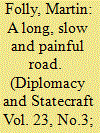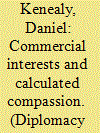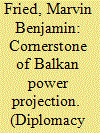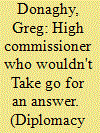|
|
|
Sort Order |
|
|
|
Items / Page
|
|
|
|
|
|
|
| Srl | Item |
| 1 |
ID:
115095


|
|
|
|
|
| Publication |
2012.
|
| Summary/Abstract |
The Second World War Anglo-American alliance was less cohesive on the political side than the military. There were widening divergences between Britain and the United States with regard to the best way to handle co-operation with the Soviet Union during 1944. Some shared assumptions about the motivations of Soviet policy existed, but British and American policy-makers not only formulated different approaches, they consistently viewed their own to be more successful than those of their ally. There was an opportunity to co-ordinate polices during American Under-Secretary of State Edward Stettinius's mission to London in April 1944 but the fact that the issue was barely discussed is symptomatic of the situation. The British Foreign Office gained the backing of Winston Churchill in an attempt to forge ahead with pragmatic arrangements with the Russians. A satisfaction with their own efforts on both sides meant that the British and American bureaucracies made no serious and sustained attempt to co-ordinate their policies towards the Soviet Union through 1944, in contrast to the closeness of co-operation in other areas.
|
|
|
|
|
|
|
|
|
|
|
|
|
|
|
|
| 2 |
ID:
115096


|
|
|
|
|
| Publication |
2012.
|
| Summary/Abstract |
Part One of this article, which appeared in the last edition of Diplomacy and Statecraft, argued that the origins and early development of British nuclear weapons was largely driven by the particular ideas and beliefs of a relatively small political, scientific, and military elite. It is also argued that these beliefs, which developed into a "deterrence state of mind" amongst the elite, derived in part from a traditional strategic culture that emphasised the importance of producing the most sophisticated weapons of the day to protect Britain's diplomatic and security interests in a largely anarchic international system. Part Two argues that these ideational factors, based on a "realist" perspective of international security held by Britain's political-military leadership, have remained of crucial importance through to the present day.
|
|
|
|
|
|
|
|
|
|
|
|
|
|
|
|
| 3 |
ID:
115099


|
|
|
|
|
| Publication |
2012.
|
| Summary/Abstract |
The release of the only man convicted of the bombing of Pan-Am Flight 103 over Lockerbie, Scotland in December 1988 is the most significant diplomatic decision taken by the Scottish government. The decision constituted a two-level process: the British government's behaviour was characterised by commercial interests; and the Scottish governments by calculated compassion. Britain's policy was steered by its national interest in securing Libya's rehabilitation into international society and ensuring that British businesses could benefit. Scotland's paradiplomacy shifted from a strategy of avoidance to one using the release to further the idea of an independent Scotland. Presenting the release in such a way was to bolster the idea of Scotland as a distinct entity with its own set of values, laws, and customs and possessing an ability to operate autonomously on the international stage.
|
|
|
|
|
|
|
|
|
|
|
|
|
|
|
|
| 4 |
ID:
115093


|
|
|
|
|
| Publication |
2012.
|
| Summary/Abstract |
This article discusses the under-researched topic of Austro-Hungarian foreign policy towards Albania during the First World War. It argues firstly that Albania's location was geo-strategically vital to both Austria-Hungary and Italy, and that only co-operation helped keep Albania's neutrality intact and generally protected the country against its hostile neighbours. The analysis then outlines that when the Austro-Italian alliance broke down in 1915, Austria-Hungary attempted to secure Albania's neutrality as a means of exercising indirect control over the country. Finally, once Central Power troops conquered most of Albania, the highest civil-military echelon in Vienna suffered serious strains as the Foreign Ministry attempted to retain Albanian independence and neutrality whilst the army desired its annexation. The Albanian neutrality case study is a prime example of a state unable to ensure or even influence its own neutrality by force, diplomacy, or the trade of vital resources, and whose geo-political position made control of the region vital. Drawing upon Hungarian and German-language sources, this article addresses a striking omission in First World War Balkan historiography, discusses a forgotten neutrality example, and provides insights into Austro-Hungarian policymaking towards this vital Adriatic territory.
|
|
|
|
|
|
|
|
|
|
|
|
|
|
|
|
| 5 |
ID:
115097


|
|
|
|
|
| Publication |
2012.
|
| Summary/Abstract |
This article examines the public diplomacy of one of Canada's first real public diplomats, Paul Martin Sr., who Prime Minister Pierre Trudeau appointed Canada's high commissioner to Britain in 1974, a bittersweet reward for almost 40 years' work in Canada's Parliament. It traces Martin's efforts to stop British authorities from moving Air Canada's landing rights from London's Heathrow Airport to remote, suburban Gatwick. It opens with a discussion of Martin's views on public opinion, focussing on his firm belief in the value of an informed public in shaping the policy-making process. These ideas inspired his diplomacy in Britain, where he set about re-building Canada's public profile, which had sagged during the 1960s and early 1970s. When his initial private efforts to resolve the looming Anglo-Canadian dispute over landing rights at Heathrow Airport failed, he moved the fight into the public realm. Explored here are his tactics and the messages he used to win over the British public to the Canadian cause, forcing the British government to retreat and preserving Air Canada's landing rights at Heathrow.
|
|
|
|
|
|
|
|
|
|
|
|
|
|
|
|
| 6 |
ID:
115094


|
|
|
|
|
| Publication |
2012.
|
| Summary/Abstract |
This article considers the ministerial career of Douglas Hogg, first Viscount Hailsham, during the 1930s and, in particular, his attitude towards the appeasement of Germany. Although Hailsham was a leading Conservative in the inter-war period and held key posts during the 1930s, his role in Britain's policy of appeasement has been overlooked. He was consistently wary of the Nazi menace and as Secretary of State for War from 1931-1935 he urged a firm line towards Hitler's Germany. As the decade progressed, however, the inescapable realities of Britain's international predicament drove Hailsham to support the government's appeasement policy, at least until September 1938. Although he forecast the near inevitability of the Second World War, he could not devise a viable alternative to the appeasement of Germany. Hailsham's experience thus offers a significant addition to the historiography of appeasement and to understanding the distinctions between "appeasers" and "anti-appeasers."
|
|
|
|
|
|
|
|
|
|
|
|
|
|
|
|
| 7 |
ID:
115098


|
|
|
|
|
| Publication |
2012.
|
| Summary/Abstract |
President Ronald Reagan's White House leaned toward Baghdad during the Iran-Iraq War because it sought to prevent an Iraqi defeat. Though the White House deemed Iraqi chemical weapons use abhorrent, it found the implications of an Iranian victory or expanded Soviet influence in the Middle East far more alarming. Newly released documents from the Iraqi state archives now allow an exploration of the chemical weapons controversy from both Iraqi and American perspectives. This evidence, along with sources from American archives, demonstrates that Washington and Baghdad had radically different assessments of the Iran-Iraq War. American officials hoped to mould Iraq into a useful ally, but Saddam interpreted American support as subterfuge. Saddam's hostile view of American intentions indicates that Washington had less influence over Iraqi behaviour during the 1980s than both contemporary American officials and many scholars writing since have realised. To insist that Washington could have deterred Iraqi chemical weapons use overstates American clout.
|
|
|
|
|
|
|
|
|
|
|
|
|
|
|
|
| 8 |
ID:
115100


|
|
|
|
|
| Publication |
2012.
|
| Summary/Abstract |
Sports-diplomacy is a familiar but relatively under-explored area of theory and practice in diplomatic studies. Existing scholarship is akin to sports-diplomacy's practice: anecdotal, sporadic articles that are case specific. This analysis posits that in the modern, plural diplomatic environment, sports-diplomacy does have potential, but that will not be realised until further discussion and scholarship is undertaken. Specifically, the "gap" in the diplomatic studies literature needs filling, as well as addressing and discussing the question: "do the benefits outweigh the dangers of 'mixing' sport and diplomacy?" The article's purpose is rudimentary. It aims to prompt discussion and debate between theorists and practitioners from both diplomacy and sport, conducive to a more durable relationship between sports and diplomacy than currently exists.
|
|
|
|
|
|
|
|
|
|
|
|
|
|
|
|
|
|
|
|
|